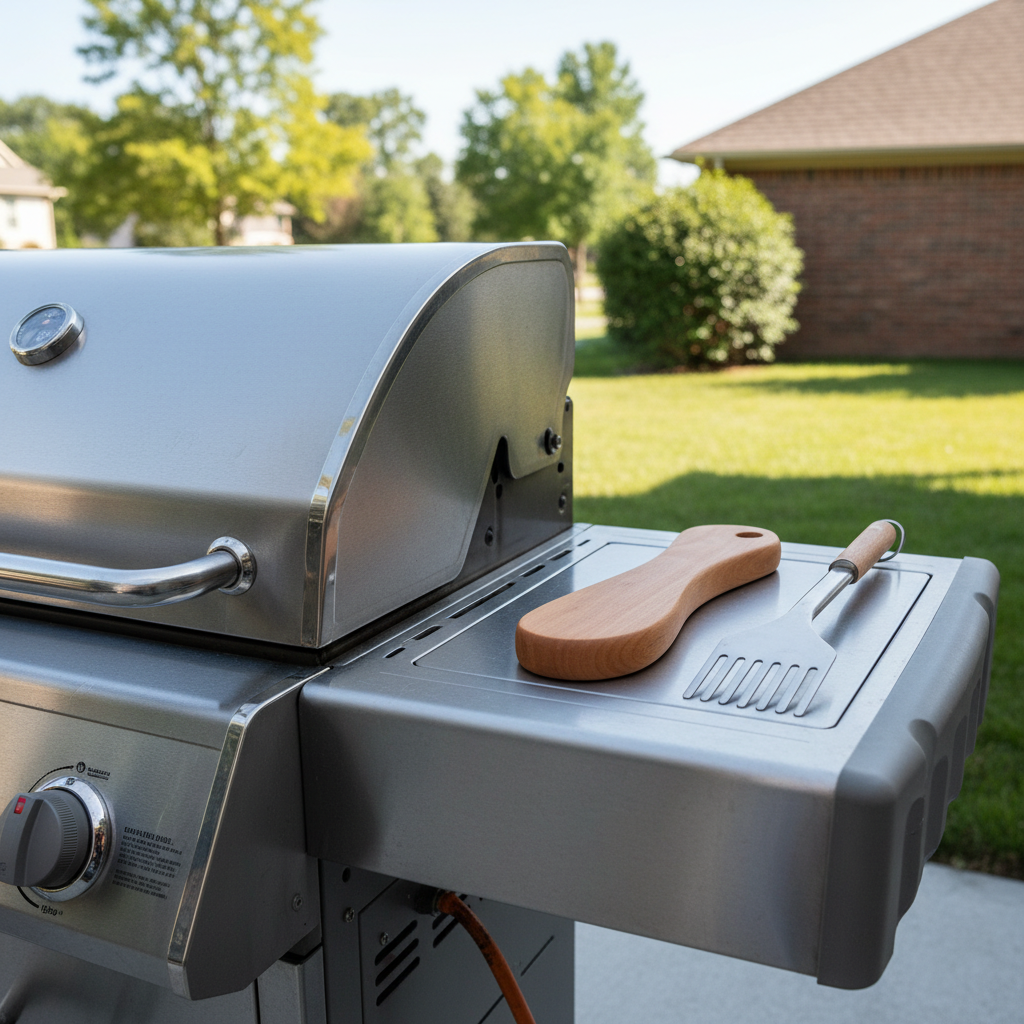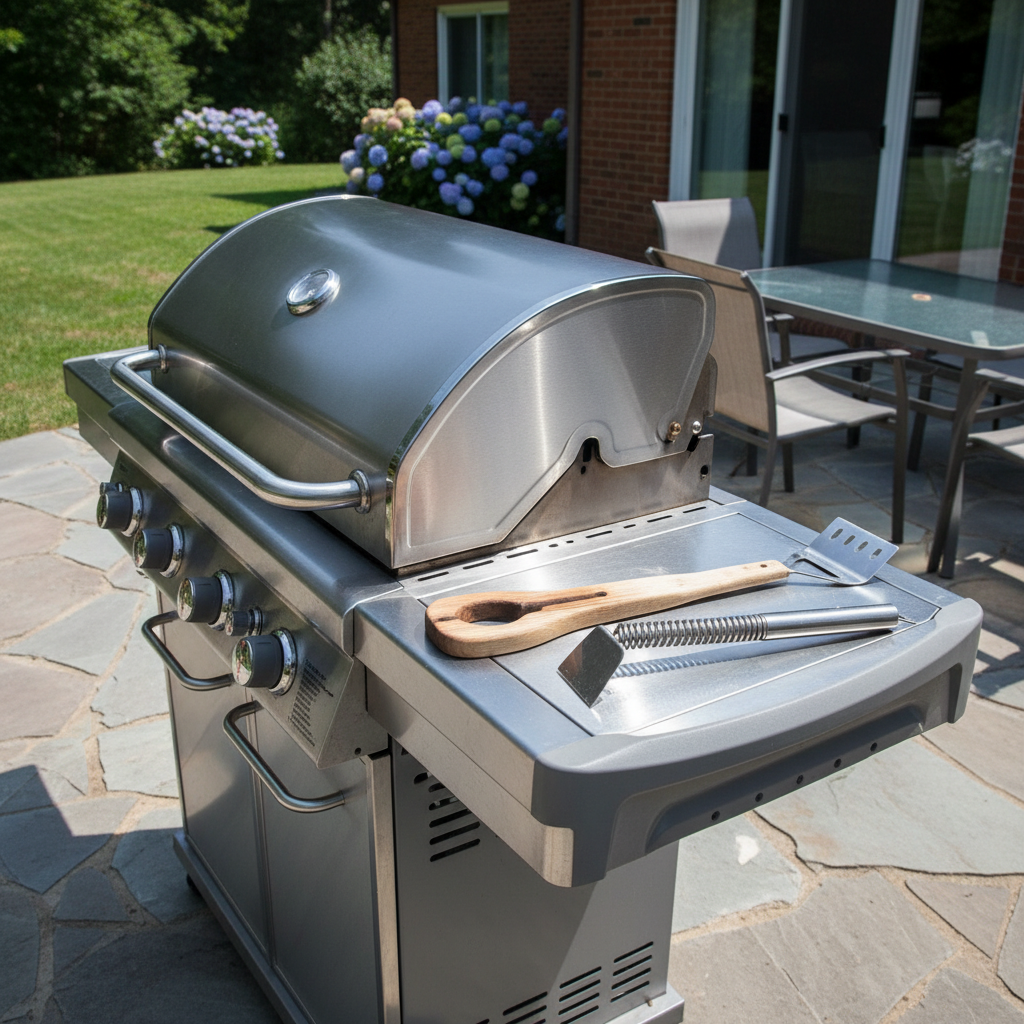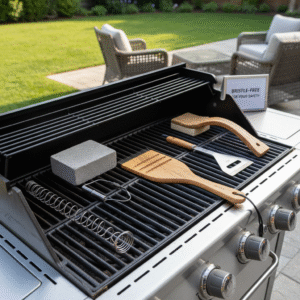
Wooden vs. Stainless Steel Grill Scrapers: The Ultimate Showdown
For any grill master, a clean grill isn’t just about aesthetics; it’s about food safety, flavor, and extending the life of your beloved BBQ. After every cookout, the battle against stubborn, charred food residue begins. When it comes to choosing the right tool for the job, two formidable contenders often rise to the top: the wooden BBQ scraper and the stainless steel grill scraper. But which one truly reigns supreme for effective and safe grill grate cleaning?
At BBQCleaner.com, we’re dedicated to helping you achieve the cleanest grill possible. In this comprehensive guide, we’ll dive deep into the world of grill scrapers, examining the pros and cons of both wooden and stainless steel options to help you make an informed decision for your grilling arsenal.
The Importance of a Clean Grill

Before we compare tools, let’s briefly reiterate why a clean grill is non-negotiable. Leftover food particles can harbor bacteria, attract pests, and impart off-flavors to your next meal. Grease buildup is a fire hazard, and excessive char can lead to uneven cooking. Regular cleaning ensures hygienic cooking, prevents flare-ups, and protects your grill grates from corrosion and premature wear, ultimately saving you money and enhancing your grilling experience.
Understanding Grill Scrapers
Grill scrapers are designed to remove baked-on food and grease from grill grates. Unlike traditional wire brushes, which pose a risk of bristles breaking off and contaminating food, scrapers offer a safer, bristle-free alternative. The primary difference between wooden and stainless steel versions lies in their material, which dictates their cleaning power, durability, and user experience.
The Wooden BBQ Scraper: Pros and Cons
Wooden grill scrapers have gained popularity for their unique advantages, particularly their ability to conform to your grill grates over time.
Pros of Wooden Scrapers
- Safety First: Bristle-Free Design: This is arguably the biggest advantage. Wooden scrapers eliminate the risk of dangerous metal bristles breaking off and potentially ending up in your food. This makes them a top choice for safe grill cleaning.
- Custom Grooves: With repeated use, the edge of a wooden scraper develops custom grooves that perfectly match the contours of your individual grill grates. This personalized fit allows for highly efficient cleaning, reaching into every crevice.
- Gentle on Grates: Wood is softer than metal, making it less likely to scratch or damage delicate grate finishes like porcelain enamel, or even seasoned cast iron.
- Natural and Eco-Friendly: Made from natural wood, these scrapers are a more environmentally conscious choice compared to plastic or metal alternatives, especially if sourced sustainably.
- Ergonomic Feel: Many users find the natural feel of wood comfortable to grip, even during extensive cleaning sessions. Consider a Safe Scrub Wooden Grill Scraper to experience this custom fit.
Cons of Wooden Scrapers
- Wear and Tear: Wood is a natural material and will eventually wear down. Over time, the scraping edge will become less effective and the scraper will need to be replaced.
- Initial Break-In Period: The custom grooves don’t form instantly. A new wooden scraper requires a few uses on a hot grill to properly shape its edge. Until then, its cleaning power might be less than optimal.
- Less Aggressive on Stubborn Grime: While effective for routine cleaning, extremely caked-on, hardened grime might require more elbow grease or additional cleaning products compared to a metal scraper.
- Moisture Sensitivity: Wood can warp, crack, or mold if not stored properly and allowed to dry completely after use.
Maintenance for Wooden Scrapers
After each use, simply scrape off any loose debris. Do NOT soak wooden scrapers in water. Wipe them clean with a damp cloth and allow them to air dry completely before storing in a dry place. To prolong their life, some users occasionally apply food-grade mineral oil.
The Stainless Steel BBQ Scraper: Pros and Cons
Stainless steel grill scrapers offer a robust and durable solution for tackling tough grill residue.
Pros of Stainless Steel Scrapers
- Exceptional Durability: Stainless steel is incredibly tough and resistant to corrosion, meaning a good quality scraper can last for years.
- Aggressive Cleaning Power: The rigid, sharp edge of a stainless steel scraper can quickly cut through tough, baked-on grease and char, making short work of heavy residue. This is particularly useful for heavy duty grill scraper tasks.
- No Break-In Period: Stainless steel scrapers are ready to perform at their best right out of the box.
- Versatility: Many stainless steel scrapers feature multiple scraping edges or integrated bottle openers, adding to their utility. Some are designed specifically for flat-top griddles, like the Blackstone Griddle Scraper.
Cons of Stainless Steel Scrapers
- Potential for Scratches: If not used carefully, a stainless steel scraper can scratch or gouge softer grill grate materials, potentially damaging porcelain enamel coatings or removing the seasoning from cast iron.
- Less Conformity: Unlike wooden scrapers, stainless steel scrapers maintain a fixed edge and do not conform to the unique shape of your grates, which might lead to less thorough cleaning in tight spots.
- Risk of Metal Bristles (if a brush, but not scrapers): While dedicated stainless steel *scrapers* are generally bristle-free, it’s crucial to distinguish them from wire brushes made of stainless steel, which carry the same bristle risk as other metal brushes. Always ensure you’re using a true scraper.
Maintenance for Stainless Steel Scrapers
Stainless steel scrapers are easy to maintain. Simply wash with hot, soapy water after each use to remove grease and food particles. Rinse thoroughly and dry to prevent water spots and maintain shine. A quick spray of grill cleaning spray/degreaser can also aid in cutting through tough residue.
Safety First: Bristle-Free Cleaning
Regardless of whether you choose wood or stainless steel, the most critical factor in grill cleaning is safety. The dangers of ingested wire bristles from traditional grill brushes are well-documented and can lead to serious internal injuries. Opting for a bristle-free tool, whether it’s a wooden scraper, a stainless steel scraper, or a Grill Rescue Brush (bristle-free), is paramount for the health and safety of you and your guests. Other safe alternatives include grill cleaning stones or specialized nylon bristle brushes designed not to shed.
Which Scraper is Right for You?
The “winner” in the wooden vs. stainless steel grill scraper debate largely depends on your specific grill, cleaning habits, and priorities:
- For the Safety-Conscious & Those with Delicate Grates: A wooden scraper is an excellent choice. Its bristle-free nature and gentler action are ideal for porcelain-coated or cast iron grates where preserving seasoning is important.
- For Heavy-Duty Cleaning & Durability: A stainless steel scraper excels at tackling really tough, baked-on grime quickly and will stand up to years of use. It’s especially effective on stainless steel grates or when you need maximum scraping power.
- For Frequent Grilling: Both can work well. A wooden scraper will develop a perfect fit over time, making routine cleaning efficient. A stainless steel scraper offers consistent, immediate power.
Many grill enthusiasts find value in owning both types, using the stainless steel scraper for initial heavy-duty removal and then following up with a wooden scraper for a more tailored, gentle clean.
Beyond the Scraper: Comprehensive Grill Cleaning
While scrapers are essential, they are just one part of a thorough grill cleaning regimen. For a truly sparkling grill, consider incorporating:
- Degreasers: Powerful sprays designed to dissolve stubborn grease.
- Brushes: Bristle-free options for reaching between grates or cleaning other grill components.
- Towels: Microfiber cleaning towels are great for wiping down surfaces.
- Grill Covers: Protect your clean grill from the elements with a Weber Premium Grill Cover.
Frequently Asked Questions
- Q: Can I use a wooden scraper on a cold grill?
- A: While you can, wooden scrapers are most effective when used on a hot grill (after cooking, while still warm) as the heat helps the wood form its custom grooves and makes residue easier to remove. Always wear heat resistant BBQ gloves when cleaning a hot grill.
- Q: Is a stainless steel scraper safe for all grill grates?
- A: Stainless steel scrapers are very effective, but caution is advised on porcelain-enameled or very heavily seasoned cast iron grates, as aggressive use can potentially scratch the surface. Always test on an inconspicuous area first.
- Q: How often should I clean my grill grates?
- A: For optimal performance and hygiene, it’s recommended to do a light scrape after every use, while the grill is still warm. A deeper, more thorough cleaning should be performed every 4-6 uses, or monthly, depending on how often you grill.
Ultimately, both wooden and stainless steel grill scrapers offer valuable benefits for maintaining a clean BBQ. Your choice will come down to personal preference, the type of grill grates you have, and the level of cleaning aggression you need. Whichever you choose, prioritizing bristle-free cleaning is the smartest move for a safe and enjoyable grilling season.
BBQCleaner.com is a participant in the Amazon Services LLC Associates Program, an affiliate advertising program designed to provide a means for sites to earn advertising fees by advertising and linking to Amazon.com. We may earn a commission from qualifying purchases made through the links on this page.
